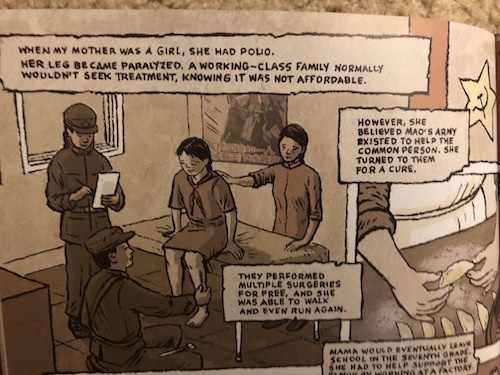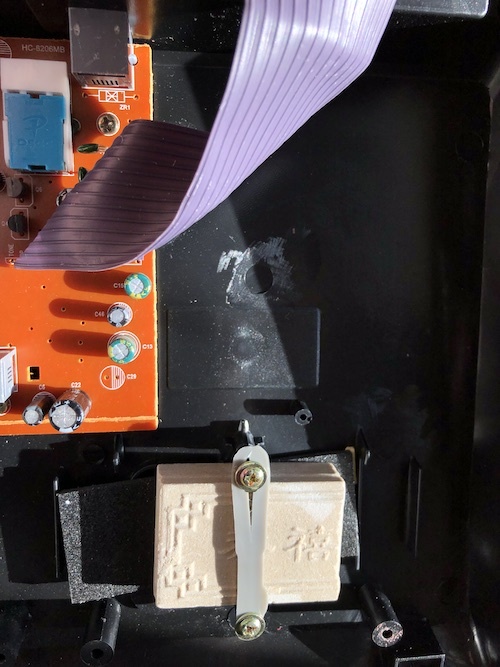Little White Duck: A Childhood in China, by Na Liu (text) and her husband Andrés Vera Martínez (art), is a collection of seven vignettes, done graphic-novel style, from the author's childhood. She was born in 1973 in Wuhan, China. Eventually she came to the United States, and now she's a doctor of hematology and oncology. She wanted to make this book to tell her daughter what life was like in China in that era, and I found it so engrossing that I sat in my car, reading it, after having picked it up from the library.

Every aspect of the book is beautiful. Andrés Vera Martínez's illustrations are full of small experiential details (Na Liu brushing her teeth at an outdoor tap, a woman riding sidesaddle on the back of a bicycle pedaled by a man, a dirty thumbprint on the titular white duck). You can tell that Na Liu shared vividly what her childhood was like. And then the stories she chose to tell were such a moving and varied collection, and they just resonated in my bones, corroborating everything Chinese friends and acquaintances of a similar age have ever said, as well as things I've read.
The first vignette is the story of Mao's death in 1976 and little Na Liu not understanding at all what's going on.
"The music was also very sad. My mother held me very tight and she started crying again. I looked around. Everyone was crying ... Seeing so many tears made me feel like crying too. After a while I couldn't stop. I cryed all the way home. My parents would explain that sad day to me many years later.
That leads into the story of her parents. Here, her mother's portion...
When my mother was a girl, she had polio. Her leg became paralyzed. A working-class family normally wouldn't seek treatment, knowing it was not affordable. However, she believed Mao's army existed to help the common person. She turned to them for a cure. They performed multiple surgeries for free, and she was able to walk and even run again.
But lest you think the book glorifies Mao-period China, there's also a vignette in which her mom tells her about the famine they lived through (as a result of the Great Leap Forward--millions died because ideology trumped common sense):
Someone in town said the mud around the temple could be eaten ... Hundreds of people, young and old, died from eating mud.
The story of the time Na Liu and her sister run around doing good, inspired by Model Citizen Lei Feng ("the tiny screw that completes the machine") ends most unfortunately for some chicks under their care--very real.
--Xiao Qin**? Did you learn about Lei Feng in school today? --Yeah. I want to be just like him
Some propaganda posters featuring Lei Feng.

Probably the vignette that will linger with me most, though, is the one the title comes from. Na Liu has a little coat she loves that has a white velvet duck appliquéd to it. When her father takes her to his natal village for a visit, she wants to wear it, even though her mom advises her not to. The children in the village have never seen anything so pretty.
--The duck is really soft. --Uh? --What's it made from? --Can I touch it too?
The kids end up playing together, but Na Liu comes away feeling shocked and sad. She concludes the vignette with a reflection from the writings of Confucius, who apparently said there are three ways to learn: by studying, which he thought was best, by imitation, which he said was easiest, and through your own experience, which can be heartbreaking.
It's a short book, but wow, it's powerful. It seems that having written this, Na Liu has just gotten on with being a doctor, but I'd like to check out some of her husband's other work.
ETA: I'm editing in a content warning. There's casual cruelty to animals in the book. Some of it is unintentional (like with the chicks), but other cruelty isn't. ... I mean there are other awful things alluded to or shown too, like famine--we live in a world filled with cruelty. But you might not expect it, and maybe you *would* expect me to mention it, so I'm mentioning it so that you won't pick up the book and get an unwanted surprise.
**Na Liu and her sister go by the nicknames Da Qin (big qin) and Xiao Qin (little qin)--a qin being that long stringed instrument that's the ancestor to the zheng (known in Japan as a koto)<--thanks for the correction on this,
![[personal profile]](https://www.dreamwidth.org/img/silk/identity/user.png) larryhammer
larryhammer.














